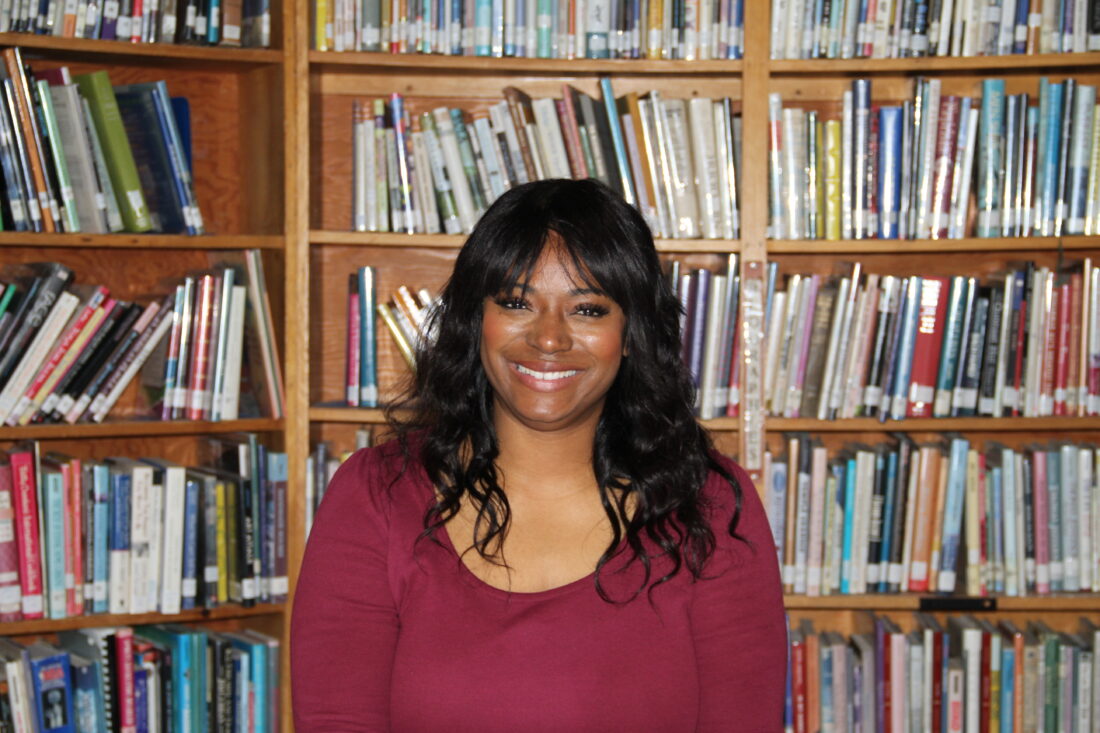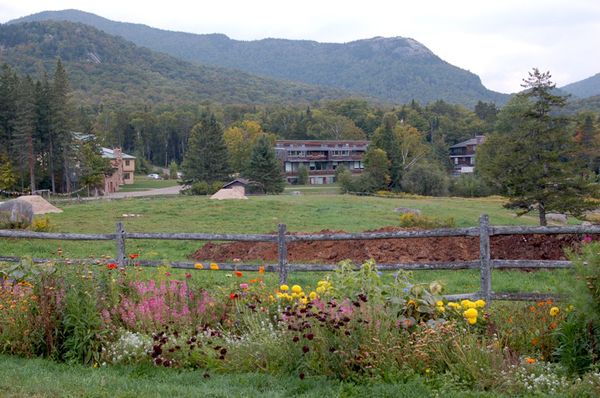Lifting every voice
Yunga Webb leads diversity, equity, inclusion at North Country School

Yunga Webb, the director of diversity, equity and inclusion at North Country School in Lake Placid, poses in the school’s library on Monday, Feb. 20. (News photo — Andy Flynn)
LAKE PLACID — One can’t help but make the correlation between the first three words of the Black national anthem — “Lift Every Voice and Sing” — and Yunga Webb’s job at North Country School.
For the past six months, she’s been the director of diversity, equity and inclusion (DEI), and for decades, she’s been a member of the Bonner Family choral group, of Salt Lake City, singing gospel songs alongside her mother, Debra; father, Harry; three sisters, Nolong, Clotile and Oyoyo; and four brothers, Mauli, Yahosh, Conlon and O/B/A.
The family joined the Church of Jesus Christ of Latter-day Saints while living in Las Vegas, and all the children have been active with music and theater.
On Feb. 17 and 18, during the NBA All-Star Weekend in Salt Lake City, Webb and her family performed the Black national anthem before the Jordan Rising Stars game and the U.S. national anthem before the NBA HBCU Classic college basketball game.
“Performing is who I am,” Webb said Monday, Feb. 20. “It was through being a performing arts instructor and a theater director that I was able to facilitate diversity, equity and inclusion. Although I will always be a part of the performing arts, I feel like DEI work is done best through something like the arts where you develop empathy and understanding, read about other stories and perform other stories.”

North Country School (News photo — Andy Flynn)
Webb was born in Las Vegas and moved to Los Angeles when she was 16 to perform professionally. She moved to Salt Lake City to finish high school and earned a bachelor’s degree in sociology at Brigham Young University, a master’s degree in education from the University of Phoenix in Atlanta, Georgia, and a DEI leadership certificate from Cornell University.
Before coming to the Adirondacks in August 2022, she was the head of the performing arts department and DEI coordinator at Harbor Day School, a private day school (grades K-8) in Newport Beach, California, just south of Los Angeles. At North Country School, a private boarding school (grades 4-9) outside of Lake Placid, she teaches a couple of arts classes along with her DEI job.
Yet moving from one of the most populated areas of the country to one of the least has its challenges, and Webb is finding it difficult to navigate the unique population of the Adirondacks.
“I’m a city girl. I like the city,” she said. “I don’t really like the outdoors. I like going for a walk on paved ground. I don’t like dirt. I like the mall. So I’m just different.”
Webb is out of her element in the Adirondacks.
“I’m so totally out of my element,” she said.
So why move to the Adirondacks? It’s all about the DEI work and the opportunity to make a difference at North Country School and the wider community.
“I wanted to have a seat at the table,” she said. “That’s the difference. When you’re in leadership, being a director, you have more of a say, you have more of a voice as opposed to ‘I’ll advise you, and take my advice or don’t take my advice.’ So I knew I wanted a school that would listen to what I had to say and how I did the work of equity and inclusion.”
In short, the values of North Country School were aligned with Webb’s own values. And although she now has to walk along the school’s dirt driveway to get from building to building, instead of asphalt, she still carries that passion for DEI work and the performing arts, no matter where she goes. Both are intertwined, she said.
For example, when Webb chose material and shows for students to perform at Harbor Day, she educated them on the experiences of the actors.
“We did ‘Joseph and the Amazing Technicolor Dreamcoat’ and we talked about privilege through doing that, because Joseph was perceived to be the favored child,” she said.
The arts can be a way to tear down barriers, which is essential to DEI work.
“It puts down walls,” she said. “We’re all just in there together sharing in our artistic space. And so I was able to do a lot of teaching and facilitating through that.”
Through the performing arts and other public programs, Webb has an opportunity to reach a greater audience, not just the students and faculty.
For example, on Feb. 1, North Country School kicked off Black History Month, with an event called “Access Outdoors For All” at the school’s Walter Breeman Performing Arts Center. It featured talks from Dom Mullins, a groundbreaking adventurer and member of the first all-Black expedition to Mount Everest, and Mirna Valerio, an ultramarathon runner and author of “A Beautiful Work in Progress.” It was another way to reach the broader community with her DEI work.
“I love to see a community change and evolve,” she said. “We, as people, when we get together, we start to create our own subcultures, our own way of living and our own environments. In doing that, we really isolate ourselves and we become less inclusive and less accepting of people that are not like us or don’t do things like us. So I really love to join a community and help them see that there’s another way of doing that. There are other people who do things this way, and it’s OK to do it like that. Let’s be inclusive, and let’s open it up.”
On the smaller level, Webb has created affinity tables, interest tables and alliance group tables at North Country School, where students are able to sit with kids that are like them.
“Whether they be Chinese-speaking students, or kids who love the outdoors or kids who just love reading or kid who just want to be quiet when they have a meal,” she said.
On the larger level, she likes having community events like “Access Outdoors For All” to help make the outdoors accessible for all people.
“I just want somebody to come to this community and feel like they belong,” she said. “Every community I go to, that’s what I want to do.”
For Webb, diversity includes every part of a person: “It’s diversity of thought, it’s diversity of experience, it’s diversity ethnically, racially, socioeconomically, sexual orientation wise, gender identity, all of it is diversity. It includes everyone. We are all diverse in different ways.”
Harbor Day is in one of the wealthiest area codes in southern California. Webb said it wasn’t as diverse as it could have been.
“Coming here, it is definitely less diverse, but we are more open to inviting people into our community,” she said. “If you’re open and your welcoming of people, then the sky’s the limit.”
Webb wants to make sure everyone has a voice at North Country School, which is known for attracting students from countries around the world.
“You will be seen, and you will be heard,” she said. “And I try to really make a space for that with our students and our faculty and our parent body. They care. They want to know if we’re really being inclusive or is it just lip service.”
Webb’s leadership philosophy is to make sure that team members practice DEI work and lead by example.
“I feel like the best leaders, when you’re trying to lead a concept or show how things should be done, are the ones that do it in their practice,” she said. “So we can talk about diversity, equity and inclusion until we’re blue in the face, but until we have equitable practices or a diverse population or have a sense of belonging and community … it’s not an academic exercise; we have to live it.”
The DEI director’s job is vast — from conversations with students all the way up to strategic planning and changing policies and procedures. How will Webb know whether she’s succeeded in helping others with diversity, equity and inclusion?
“When I think about my students, and as they go on, that they’re not only comfortable being around populations that are different than who they are, but they understand how to navigate and be inclusive to others and accepting and grow,” she said. “And not have those barriers so we can create this utopian society eventually of people that are all different from all different walks of life that get along and understand each other and complement each other.”
Webb wants North Country School to be a place where everyone feels at home.
“When you feel like that here, I feel like at the macro level we’ve done something great,” she said.
To get to that point, everyone must practice empathy, putting themselves in other people’s shoes.
“I’m learning, too, and I mess up, too,” she said. “All I can speak to is my Black woman experience, middle class Black woman, private school educated, single mom, that’s the only experience I can speak to. I don’t know what it is to be a white male. I don’t know what it is to be a Latino young boy. I don’t know what it is to be transgender. I don’t know what it is to be queer. So I have to practice empathy and learn myself. … Empathy is the root, and it’s the key.”
Getting to the point where everyone is practicing DEI work takes time, even for Webb: “It is challenging because I myself struggle with my own sense of belonging here. It’s just such a different place than what I’m used to. It’s not the most comfortable place for me. Once I feel like I belong, I think I’m doing some great things. … If a different version of Yunga came here and felt like she’s at home, then we’re doing some good work.”




